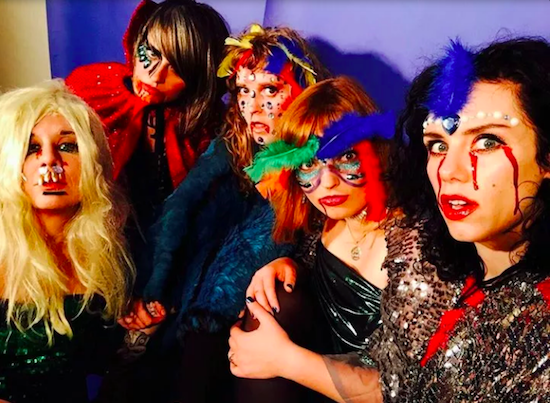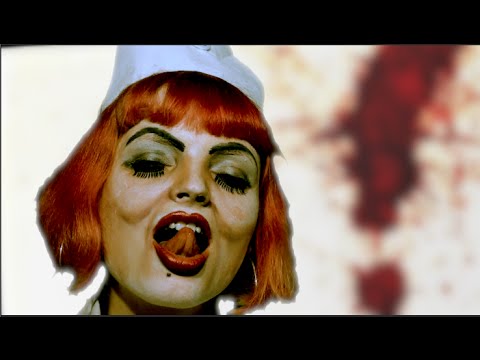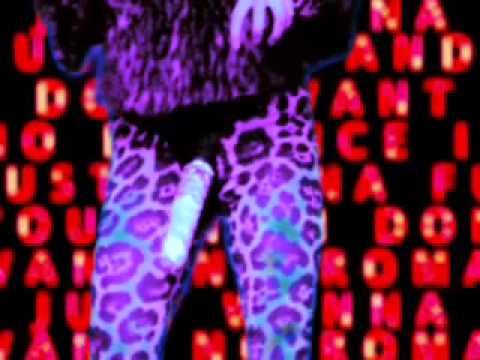ILL rose from the ashes of a Manchester all-women improv collective a few years ago, and have been spreading rage, resistance, pleasure, pisstakes and post-punk disco heavy-psych party vibes across the Northwest and beyond ever since.
‘Space Dick’ is a Pigbag-ish, Le Tigre-tinged party starter soundtracking the realisation that even if we colonise Mars as a matriarchal paradise, Elon Musk will probably turn up on his souped-up C5 and ruin it for everyone. ‘Bears’ is a slow, relaxed threat of extreme violence and fairytale revenge on unnamed foe. ‘ILL Song’ laments, in a beautifully deranged way, the steady destruction of our national mental health services. What began as noise and improv, with music played on sheets of metal, old vibrators and contact mics secreted around the body, has evolved into noise and improv with added dance-like-a-bastard fuzz and synth and shout-along choruses.
We spoke to Harri Shanahan, who sings and plays keyboards, and Whitney Bluzma, who sings and plays bass and percussion. There’s also Fiona Ledgard, the drummer, and Tamsin Middleton on guitar, with occasional appearance from former member Sadie Noble, who wrote and played all the guitar parts on the album and will be playing some of the shows on the tour that starts tonight.
They’re all part of a lovely seething network of bands and promoters in Manchester and beyond – “Mold, Gnod, The Yossarians, Fat Out, Soup Kitchen, Islington Mill…” they list. “Then Matt at Box Records is also in Pigs x 7, and there’s Dorcha in Birmingham who have been really supportive and who we play with a lot.”
“There’s a lot going on,” says Harri. And in the music too. “Fiona loves 80s disco, Whitney’s more post-punk, Tamsin’s more rock. I just like hitting things.”
“We never try to sound like anything,” says Whitney. “We have two sounds – the slow and gothic and the pop bangers.”
Harri agrees, kind of: “We have our ‘dinosaurs having sex in space’ songs and our ‘Powerpuff Girls on a knife rampage’ songs.”
Your songs do manage to be very angry and very funny at the same time.
Whitney Bluzma: Sometime you have to make a joke of very serious matters. If you were just completely honest about some of your day-to-day experiences you’d be writing very miserable songs
Harri Shanahan: Having a laugh about the things that piss you off on a daily basis is one way to get through it. We’ve weaponised sarcasm. We could have written, “Fuck you, stop following me down the street, stop groping us when we do a gig in Oldham, just fucking leave us alone.” But we didn’t write that, we wrote ‘Space Dick’ instead.
WB: Space Dick is very much about embracing the ridiculousness of misogyny and running with it. And ‘Ill Song’ came out of us being dismissed as mentally ill. We took it as a badge of pride. It’s dedicated to people who say, “Why don’t you just meditate? Do some yoga, that’ll sort you out.”
HS: It doesn’t hurt but it’s not a replacement for adequate health provision, is it? And I sometimes wonder if we get labeled as mad because we are women who don’t like what’s going on in the world.
Which is what ‘Hysteria’ is about – the connections between your social-political status and your mental health.
WB: It’s frustrating – behaviour that’s on the slightly intense side of normal is really considered outrageous for women. All that stuff. I’ve been told I’m very outspoken. I’m not outspoken, I’m just speaking.
HS: Whitney and I both come from culturally conservative backgrounds, and there’s something quite delicious about just going “RAAAAARRGHHHHHHH!” when you’ve been told – not necessarily by your family but by the world around you – that as a girl you should be quiet and nice and polite.
WB: This is our outlet. For embracing that anger and releasing it as positive energy. This is how we cope with what’s happening to us.
HS: There’s something nice about just getting together as a gang and dropping the mask and saying, “Yep, they’re all dickheads, aren’t they?” It’s like the emperor’s new clothes. Everyone’s pretending everything’s cool all the time, and then there’s that relief when someone says, “No this is actually bullshit.”
How have things changed as the lineup has shifted?
HS: We’ve got less experimental. We’ve gone from saws and vibrators to someone actually playing guitar. So over the past six years it’s got more musical – it’s still noisy but it’s got more danceable.
WB: It has more structure now. We started as a purely improvisational band, as a continuation of Womb, a women’s jam band with 14 members just making a racket.
Women’s jam sounds delicious.
HS It was! It was mental. So we came out of that and we’ve found our own voice, we’ve moved from Womb to Ill. We didn’t have any intentions, it’s just happened.
Is improv still part of your process?
WB: You can hear it on the album, on ‘Slithering Lizards’. When it was recorded most of it was improvised. When we play it live, we know that it slows down and speed up but it’s open to improvisation.
HS: It’s something we like to do, but we’re not an improv collective any more. When we write a song, we just jam and see what happens. The ones that everyone likes, they stick, and if they’re rubbish they die and go to the ILL song graveyard. There’s a few I’d like to resurrect, though, a few good zombies.
One thing I like on this album is that the energy and the rage is solid, sustained. On ‘Slithering Lizards’ though, and on ‘Bears’ and ‘Power’, there’s a weight to it – the rage starts to get heavy.
HS: They’re different kinds of energy, different kinds of anger. There’s a quick, furious anger and then there’s a slow, cold anger. And the cold anger is coming in on those songs.
WB: ‘Bears’ and ‘Power’ are both about a reaffirmation of the individual, about taking power over your life. There’s a gathering together of strength, announcing “I’m here and I don’t give a shit. This is me.”
HS: Those two songs are based in personal experience. Whitney wrote ‘Bears’ about something definite that happened to her and ‘Power’ is directed at a particular period in my life when I was struggling. Those two are about relationships, whereas the others are more about wider society.
WB: I come from Latvia, and bears are the biggest and most grand animal in Latvia. So ‘Bears’ is about finding power, standing against people who are giving you shit, saying, “No thank you. This is me and I am ready to battle you.”
Summoning the power of your heritage.
HS: It’s Latvian witch power.
WB: They’re big on witchcraft in Latvia. You can hear that in the song, it’s spooky and strange.
What video are you making next?
HS: I’d like to do one for ‘Hysteria’, I have ideas. I want to go in hard with the religious symbolism.
WB: We’ve been talking about women chopping things with massive oversized knives. That suspension of anger when you’re trapped in this patriarchal world, and you do everyday things but in a threatening manner, just on the edge of bursting forward.
HS: I see my grandmother do it sometimes, when she’s cooking or baking – bang! bang! bang! – and I think, I know what’s going on here.
How involved are you in the video making?
HS: We do it all. A green screen from Argos, an old lighting kit, and the local pound shop. That’s how we do.
WB: If you look at the videos for ‘Ill Song’ or ‘Space Dick’, both of those were green screen in Harri’s front room.
HS: It’s a case of shoot in haste and post-produce in pain. Whitney does some programming and graphics and I’m the animator amateur.
WB: The first video we did, for our Iggy & The Stooges cover ‘Cock In My Pocket’, I got to Harri’s house and she just said, “Here’s some banana peel, hold it between your teeth and it’ll be your tongue, and here’s your massive dildo to wear.”
HS: We did discuss the concept beforehand!
What was the headline on that concept?
HS: It was two things: B-movie monsters and Freud. It’s about ‘penis envy’ and the old treatment of hysteria where they just fingered you and that’s how the vibrator got invented.
WB: I remember you mentioning this idea that women are going through all this penis envy, and the fear that if the woman was to achieve the penis, then all hell would break loose. It would be really destructive and everyone would die!
HS: It’s the fear of female sexuality, and lampooning it for all its worth.
You get described as DIY a lot, what do you think people mean when they say that?
HS: We don’t have a PR, we don’t have an A&R. We have a producer now, though. Whitney used to produce it all but we work with someone now, I don’t know if that removes our DIY status? I’m not sure we are a DIY band anymore.
WB: Before this release, all the cds we printed ourselves, folded the cardboard covers, made our badges. Recently Harri was working on a film, interviewing some women from the punk scene in the 80s, and they were saying, “Back in our day, we used to record our own records, print our own T-shirts.’ And Harri’s like, ‘Yeah, we’re still doing that.”
HS: The amount of time I spend gaffer-taping things implies a heavy DIY element, I think.
I’m interested in the idea of being authentic and having no money, the idea that there’s something wrong with being alright and not being skint all the time.
HS: It would be really nice to have some money. What we want to have, though, is control over our visual image. That’s very important to us because there’s you can get polished and blandified.
WB: Some of the bands we know who’ve done really well, they’ve had their record company executives saying, “Oh, you’ve got to show some flesh or the album won’t sell.” We don’t want to get to that point. It’s easier to be smaller, to not have that kind of success.
HS: When we started working with the John Tatlock, our producer, we knew he understood our sound, and Whitney talked to him a lot about how it was going to get made. We wouldn’t have worked with someone who wanted to make it super shiny. He still did a lot of work but it’s us on a very good day, basically. We didn’t want to sound like Duran Duran.
WB: He approached us and said, “I’m happy to do this for free, because I think you have something special and it’s going somewhere. You can pay me later if you get some money.” It was the same with Box records – they just wanted the album as it is, with own artwork. We were going to put it out ourselves. We have some savings from gigs, putting £20 away every time we played. I’m the treasurer of the band and everything was in a cosmetics bag under my bed. Then last summer I was looking in there and I just thought, There’s no way – we can’t buy 500 vinyl with this. It just wasn’t going to happen. A couple of months later, Box got in touch and said, “Have you got anything you want to release?”
HS: It was great.
WB: We jumped at the opportunity. They just said, “You keep the copyright, no contracts, everything’s 50-50, we don’t want to change anything, do your own thing.”
HS: We’ve been very fortunate, we’ve had a lot of stuff come to us and a lot of support from the Manchester scene.
Do you feel very much part of that scene?
HS: Yes, and the network spreads beyond Manchester.
WB: We’ve made friends with some great bands in different cities, we play together, we invite each other to play. Since we’ve started in 2012, we’ve see the shape of the underground community in the UK. Every time we play somewhere we meet someone else who puts on gigs or plays in bands. It’s very friendly, everyone is supporting each other.
HS: It’s quite rare to do a gig and not meet someone who asks you to do another gig.
WB: The entire underground music scene runs on enthusiasm, because nothing makes any money. You move around the country and there’s all these promoters and bands doing it just for the love of music.
HS: Not that we couldn’t do it even better if we had a few bob.
WB: It’s a network of trust, bringing good things to people. It’s amazing.
Did you both grow up in religious households?
HS: I certainly did. I grew up in Wales but my family’s from Kent, via Ireland. There was a lot of mass.
Do you think that’s influenced the album?
HS: I would say so. And it’s the same with Latvia…
WB: It’s not a Catholic country but it’s incredibly conservative. Growing up I couldn’t really see it, but they’re probably about 50 years behind the UK in terms of rights for women and rights for queer people. “You’re a woman so be polite, don’t raise your voice.”
HS: “Hurry up and have a baby.”
WB: If you’re not married, there’s something wrong with you. Sometimes I go home and I see TV shows where they interview successful women, famous singers, and they still want to know how she can manage that and have children. They don’t ask men about that.
It’s not that different here, is it? Women still get those questions.
HS: Like that tweet about the England women’s football team – “Now they go back to being wives and mothers.” Everyone was like, would you say that about the men’s team? I was laughing. If you didn’t laugh, you’d kill a dude.
What brought you to Manchester, Whitney?
WB: I moved here in 2008, after studying sound engineering in Bournemouth. I’d read so much about The Smiths and Joy Division, I knew the history, and I thought it must still be a place for creative great people, and I wasn’t wrong. Then I met Harri at a strange church where they were looking for people to help kids make music videos.
HS: It seemed dodgy there, though, so we left and started chatting about doing something else.
WB: I was saying that I wanted to be in an improv group with women, I wanted it to sound like Can, like Faust, like The Fall. And Harri just said, “Oh, I’m in one.” So I joined Womb. And we just had these amazing noise jams with loads of amps in a tiny basement room. You couldn’t hear a thing you were doing.
HS: It’s nice being in a band with just four of us now, we can hear what we’re doing.
WB: It was a great confidence boost though, making all that noise with those women. It was a catalyst, for me, like that famous Sex Pistols gig at the Free Trade Hall was for other people. I didn’t think I could play enough to be a proper musician, then in Womb there were women who’d never picked up an instrument before just making a racket.
HS: I’d never sung, I’d never talked into a microphone, until I joined Womb.
WB: And then two months after I joined, they said, “Okay we’re making the first album.” We booked a studio and just jammed for an entire day, no idea what we were doing. Fiona, too, just picked up a snare, and she liked it, and she was good, so she was the drummer.
How long did Womb go for?
HS: About a year. It started to feel like it was going to be a proper thing – gigs, an album. And that caused a schism, because some people were busy doing other things. Things got a bit tense.
WB: There’s always other things, there’s always work pulling you away. I can understand where that conflict came from.
HS: Oh my god, it shouldn’t be that difficult to get us all the same room now, with four of us, but it really is.
What have you got planned for the live shows?
HS: We’re going to kick out the jams. Play everything we’ve ever written with as much gumption as we can muster.
WB: Sadie is joining us so we have a chance to play songs we haven’t played for a while, songs on the album that have Sadie singing on them. It’ll be a nice send-off because we might never get to play them again unless we have Sadie.
HS: So we’re saying farewell to Sadie, and let’s have a riot.
I love that line in ‘I Am The Meat’: “Give me all your gravy – I am the meat – This is just for starters.”
HS: We were playing a gig at the Roadhouse with Sex Swing and Shit & Shine – a great gig. Someone listed it in the local paper as “There’s support from local band ILL, but the real meat will come from…” And I was like, “No! We are the meat!” This is just for starters is the message of the album really. This is just for starters.
We Are ILL is out on Box Records today. ILL play the Sebright Arms in London tonight then tour. More here




